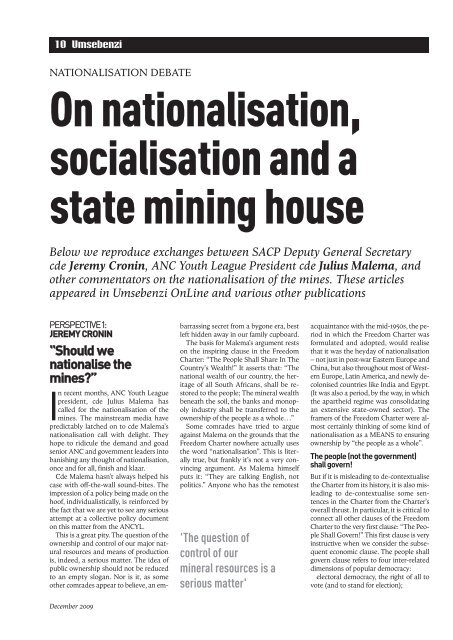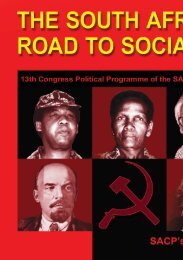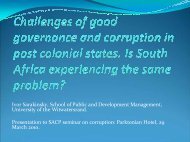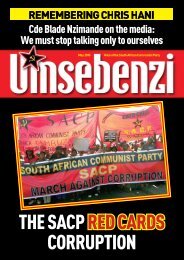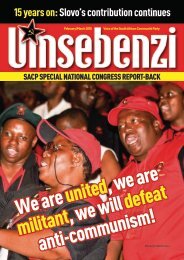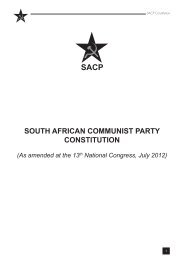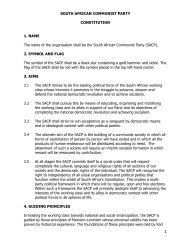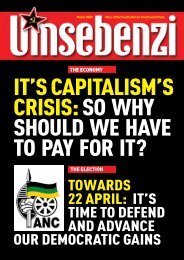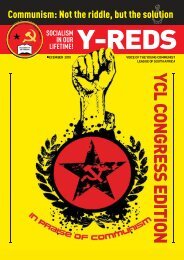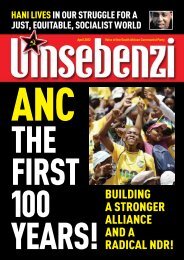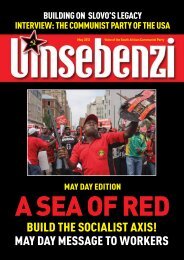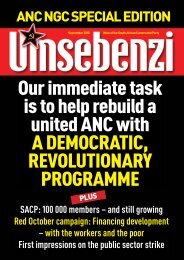Forward to Socialism!! - South African Communist Party
Forward to Socialism!! - South African Communist Party
Forward to Socialism!! - South African Communist Party
Create successful ePaper yourself
Turn your PDF publications into a flip-book with our unique Google optimized e-Paper software.
10 Umsebenzi<br />
NATIONALISATION DEBATE<br />
On nationalisation,<br />
socialisation and a<br />
state mining house<br />
Below we reproduce exchanges between SACP Deputy General Secretary<br />
cde Jeremy Cronin, ANC Youth League President cde Julius Malema, and<br />
other commenta<strong>to</strong>rs on the nationalisation of the mines. These articles<br />
appeared in Umsebenzi OnLine and various other publications<br />
PERSPECTIVE 1:<br />
JEREMY CRONIN<br />
“Should we<br />
nationalise the<br />
mines?”<br />
In recent months, ANC Youth League<br />
president, cde Julius Malema has<br />
called for the nationalisation of the<br />
mines. The mainstream media have<br />
predictably latched on <strong>to</strong> cde Malema’s<br />
nationalisation call with delight. They<br />
hope <strong>to</strong> ridicule the demand and goad<br />
senior ANC and government leaders in<strong>to</strong><br />
banishing any thought of nationalisation,<br />
once and for all, finish and klaar.<br />
Cde Malema hasn’t always helped his<br />
case with off-the-wall sound-bites. The<br />
impression of a policy being made on the<br />
hoof, individualistically, is reinforced by<br />
the fact that we are yet <strong>to</strong> see any serious<br />
attempt at a collective policy document<br />
on this matter from the ANCYL.<br />
This is a great pity. The question of the<br />
ownership and control of our major natural<br />
resources and means of production<br />
is, indeed, a serious matter. The idea of<br />
public ownership should not be reduced<br />
<strong>to</strong> an empty slogan. Nor is it, as some<br />
other comrades appear <strong>to</strong> believe, an embarrassing<br />
secret from a bygone era, best<br />
left hidden away in our family cupboard.<br />
The basis for Malema’s argument rests<br />
on the inspiring clause in the Freedom<br />
Charter: “The People Shall Share In The<br />
Country’s Wealth!” It asserts that: “The<br />
national wealth of our country, the heritage<br />
of all <strong>South</strong> <strong>African</strong>s, shall be res<strong>to</strong>red<br />
<strong>to</strong> the people; The mineral wealth<br />
beneath the soil, the banks and monopoly<br />
industry shall be transferred <strong>to</strong> the<br />
ownership of the people as a whole…”<br />
Some comrades have tried <strong>to</strong> argue<br />
against Malema on the grounds that the<br />
Freedom Charter nowhere actually uses<br />
the word “nationalisation”. This is literally<br />
true, but frankly it’s not a very convincing<br />
argument. As Malema himself<br />
puts it: “They are talking English, not<br />
politics.” Anyone who has the remotest<br />
'The question of<br />
control of our<br />
mineral resources is a<br />
serious matter'<br />
acquaintance with the mid-1950s, the period<br />
in which the Freedom Charter was<br />
formulated and adopted, would realise<br />
that it was the heyday of nationalisation<br />
– not just in post-war Eastern Europe and<br />
China, but also throughout most of Western<br />
Europe, Latin America, and newly decolonised<br />
countries like India and Egypt.<br />
(It was also a period, by the way, in which<br />
the apartheid regime was consolidating<br />
an extensive state-owned sec<strong>to</strong>r). The<br />
framers of the Freedom Charter were almost<br />
certainly thinking of some kind of<br />
nationalisation as a MEANS <strong>to</strong> ensuring<br />
ownership by “the people as a whole”.<br />
The people (not the government)<br />
shall govern!<br />
But if it is misleading <strong>to</strong> de-contextualise<br />
the Charter from its his<strong>to</strong>ry, it is also misleading<br />
<strong>to</strong> de-contextualise some sentences<br />
in the Charter from the Charter’s<br />
overall thrust. In particular, it is critical <strong>to</strong><br />
connect all other clauses of the Freedom<br />
Charter <strong>to</strong> the very first clause: “The People<br />
Shall Govern!” This first clause is very<br />
instructive when we consider the subsequent<br />
economic clause. The people shall<br />
govern clause refers <strong>to</strong> four inter-related<br />
dimensions of popular democracy:<br />
elec<strong>to</strong>ral democracy, the right of all <strong>to</strong><br />
vote (and <strong>to</strong> stand for election);<br />
December 2009


